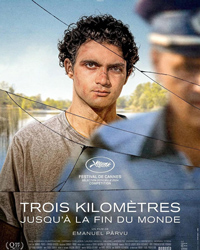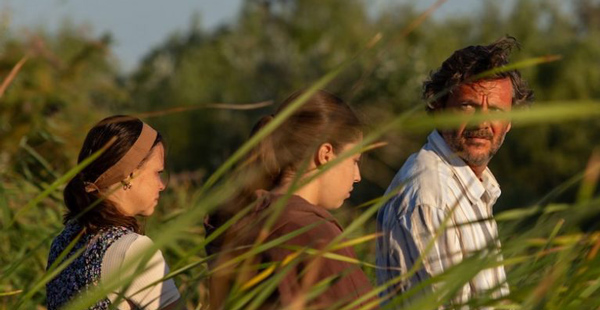It Can’t Happen Here: Parvu’s Agonizing Procedural on Small Town Homophobia
 For his third feature, Three Kilometers to the End of the World, Romanian director Emanuel Pârvu once again tackles a scenario of strained relations between children and their parents. In the familiar tradition of the titans of the Romanian New Wave, Pârvu presents an excruciating scenario of corruption and torturous bureaucracy in post-Communist Romania which unspools like a criminal procedural. Fluctuating power plays abound when a young man is beaten for being gay while on summer vacation in his small village, an isolated community in the Danube Delta, which can only be reached via boat. Immediately, the conflicting agendas of local law enforcement, the victimizers, and the teenager’s ignorant parents clash, setting in motion a swiftly evolving ripple effect of physical and emotional trauma for the young man at the center of this discord.
For his third feature, Three Kilometers to the End of the World, Romanian director Emanuel Pârvu once again tackles a scenario of strained relations between children and their parents. In the familiar tradition of the titans of the Romanian New Wave, Pârvu presents an excruciating scenario of corruption and torturous bureaucracy in post-Communist Romania which unspools like a criminal procedural. Fluctuating power plays abound when a young man is beaten for being gay while on summer vacation in his small village, an isolated community in the Danube Delta, which can only be reached via boat. Immediately, the conflicting agendas of local law enforcement, the victimizers, and the teenager’s ignorant parents clash, setting in motion a swiftly evolving ripple effect of physical and emotional trauma for the young man at the center of this discord.
Parvu settles quickly into the film’s main conflict as seventeen-year-old Adi (Ciprian Chiujdea) returns home one night badly beaten, presumedly for tender caresses shared with a young man from out of town on a dimly lit street. The perpetrators are the sons of the local big fish and corporate gangster, Zentov (Richard Bovnoczki), whom Adi’s father (Bogdan Dumitrache of When Evening Falls on Bucharest or Metabolism, 2013) unfortunately owes money to. The police chief (Valeriu Andriuta) is also good buddies with Zentov, who has power over whether he’ll get the early retirement he wants. When it’s discovered Adi was beat up for being gay, it seems a clear relief to the police chief—this is something everyone would like to have covered up, including Adi’s overtly religious mother (Laura Vasiliu) (4 Months, 3 Weeks, 2 Days, 2007). But this causes a drastic spiral at home, leading to an exorcism against Adi’s will, who is later locked within his room. Luckily, his sole friend, Ilinca (Ingrid Berescu), a local girl his parents previously thought he was dating, reports the situation to Children’s Services in the nearest town, Telciu. An investigator arrives, only to cause the locals to scramble to cover up their crimes, leaving Adi with all the power, should he choose to file a complaint.

Pârvu’s examination of homophobia in a small town might be excused or written off based on its specific location. But in truth, this ignorance, these attitudes, and this violence against the LGBTQ+ community happens everywhere, in cities and towns large and small, in countries proud of their progressiveness and those hellbent on remaining as archaic as possible. The subject matter and tonality are perhaps most comparable to Pârvu’s fellow countryman, Cristian Mungiu, who has explored a similar wretchedness experienced by those whose lives force them into situations at odds with the rigid cultural framework forced upon them. Mungiu’s forte has almost exclusively dealt with the lives of women whose bodies or sexuality have been subject to religious or legal sanction, and Mungiu’s Beyond the Hills (2012) is an apt comparison. It’s refreshing to see Parvu tackling homosexuality head on, even if anyone within the community is well acquainted with these stories and experiences, adept at compartmentalizing and numbing oneself to witnessing another example in a never-ending parade of these sorts of narratives, which often end tragically, or in some other heavily compromised sort of fashion.
The film hits its stride when an investigator (Alina Berzunteanu) from Children’s Services shows up, though she’s thwarted at every conceivable step. The best moment arrives upon her interrogation of the ignorant priest (Adrian Titieni) who performed the exorcism. “You can believe whatever you want, but you can’t do whatever you want,” she wearily remarks. At the end of the day, justice is hardly something we can expect for Adi—but he gets the next best thing.
Reviewed on May 17th at the 2024 Cannes Film Festival – Competition. 105 Mins.
★★★½/☆☆☆☆☆


